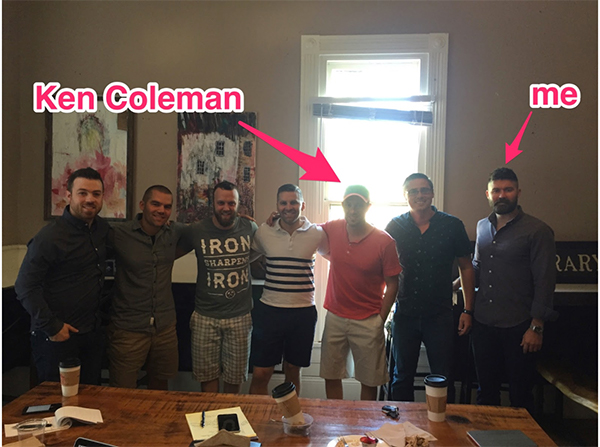5 Habits of Incredibly Effective Speakers
Keys to Better Sermon Prep
by Keith Cook
If you’re reading this…
I bet you’re not a terrible speaker.
In fact…I would imagine that you are probably above average.
You’re a pastor or leader of some sort and weekly have to get up in front of people to communicate.
But I wonder…
What separates you from the top speakers and communicators?
Most likely, the difference lies in your habits. It’s the things you do (or don’t do) daily that separates you from the next level of communication.
If you find yourself wondering, “Am I an incredible speaker?”…
Here are the habits that you need to develop in order to know you are effectively connecting with your audience.
So right out of the gate here’s Habit 1.
Incredible speakers have the habit of knowing the focus and goal of their message.
I’ve heard it said that strategic planning is simply knowing where you are, knowing where you want to go, and charting the course on how best to get there.
That’s what you want to do when you are preparing to speak. You want to know who you are talking to and you want to know the goal and focus of what you will be talking about.
Without that you’re like a toddler in Cracker Barrel playing that weird peg triangle game.
You have no idea what the point of the game is so you just start putting the pegs in holes and giggling and knocking over water and stuff.
You get my point.
Before you get started preparing your talk or message you have to know the goal.
It sounds a little overly simple but you would be surprised how many folks don’t know this.
So here’s what I suggest…
Get out a legal pad and simple write down the focus and goal of your message the best you can.
Put it in writing somehow before you dive into prep.
Shameless plug…the best resource I’ve used that helps you outline your message and find your focus is SermonCraft. It’s a template in booklet form that walks you step by step on how to prepare a killer talk or sermon week after week.
After incredible speakers determine the goal of their talk they then shift focus to the second habit.
The second habit helps them tailor the message. When done well, the second habit will make preparation and communication much easier.
To communicate effectively you have to develop habit two which is, KNOW YOUR AUDIENCE.
Incredible speakers know their audience on a deep level.
They study them. They watch them.
If you don’t know the audience, your people, then you have know idea how to connect with them. You won’t know their pain. You won’t know where they are at spiritually, emotionally, mentally.
You’ll just be throwing darts in the air praying they hit a target that you never actually found to begin with.
For example, if you were speaking to a group of teenagers and you started using stories and metaphors more suited for the Shoney’s crowd… #fail. 🙁
And if your congregation is made up of mostly single folks and you start talking about your spouse and kids all the time… #doublefail.
You have to know who it is you are talking to and you have to dive deep into their lives.
And here’s how you do that…
You must begin to explore life through their eyes.
For starters, you ask the questions…
- What is their biggest fear?
- What is their greatest aspiration?
- What are they probably thinking about on Sunday morning?
- What are they worried about?
- What does Monday look like for them?
- What will they be saying and doing throughout the week?
- Why are they here?
- What are they doing right now? Why?
- Where do they work? Why?
You could probably spend a good hour on this. It’s important. The more you know the people the better you will be able to communicate with them.
And that brings us to the next habit of incredible speakers:
Incredible speakers have developed the habit of delivery captivating stories.
When I was in seminary down in New Orleans, pre-flood, I remember one of my professors encouraging me to develop a “swipe file” of stories and illustrations. This greatly improved my sermon prep.
Now back then we didn’t have Evernote, Google Drive, Dropbox, and all those fun toys. We had actual manilla folders where we would collect news articles and copied pages out of books. Some of ya’ll know what I’m talkin’ bout.
These articles and stories were meant to be used to help support your goal and focus.
The masters of communication know how to find and craft amazing stories. They know the elements of a powerful story and they always have their radar up looking for ways to better connect the message to the audience.
A straight up Mr. Miyagi of storytelling is Andy Andrews. If I were you… I would study how this guy connects and delivers his stories. He’s made this bearded guy cry a few times. 🙂
Here’s a recent interview Andy did with Dave Ramsey about the Power of Storytelling.
http://www.daveramsey.com/blog/andy-andrews-discusses-the-power-of-storytelling
When it comes to storytelling, you have to study other speakers. Find out what works and what doesn’t and why. To become an incredible speaker you must learn to tell a story that engages your audience and keeps them focused on the goal.
In order to do that effectively remember, you have to know your goal (Habit 1) and your audience. (Habit 2).
Anybody can create an outline. It’s easy. But not everyone can tell a story. It’s not so easy. Study the greats and learn the elements of storytelling. You’ll find that a common denominator in all those folks is they have developed the habit of good storytelling.
Now Habit 3 is where you turn your attention to “take aways”. How are your people going to remember what you talked about?
An important element to that is storytelling but equally as important is creating “Sticky Statements”.
Incredible speakers know how to craft “Sticky Statements” in their sermon prep.
These are memorable, bottom line, short and sweet statements that will be repeated throughout your message.
I mean you know that sermons, talks, speeches really only boil down to one main thing, one major take away.
You want to develop the habit of thinking through how your audience will remember your message.
You want to give them these statements to support your stories and goal.
Sticky statements are meant to help the audience remember the sermon long after they walk out of the building. They are meant to stick.
Here are the key elements in crafting “Sticky Statements”:
Ask yourself…
- Is there a word picture of metaphor?
- Can I use a rhyme to make it memorable? (Just not cheesy!)
- Can I echo words or phrases to help it stick?
- Will alliteration drive it home?
- Can I contrast two phrases, words or ideas?
- Is there a hook you can repeat again and again?
“Sticky Statements” are powerful tools of incredible speakers.
But the last habit is what separates the men from the boys.
So here’s the deal…
To be an incredible speaker, the most important habit you have to develop is knowing how to prepare. (And actually over-prepare. It’s called “sermon prep.”)
This one habit is the game changer in going from average to incredible.
It’s the key to better preaching and speaking.
Top performers know this. They know it’s crucial.
I mean, I care about eye contact and I care about enthusiasm on stage but…
When you prepare the RIGHT way, the way incredible speakers prepare, then you don’t have to worry near as much about those things.
I remember sitting down with Ken Coleman (see pic below), the host of Dave Ramsey’s Entreleadership Podcast, and he said…
When have mastered their sermon prep, they are comfortable.
- They know who they are talking to.
- They know their message will connect.
- They know what they look like on stage.
- They know they are making good eye contact.
- They know… because they practiced it over and over and over.
- They recorded themselves and watched it. They adjusted. Recorded themselves again. Had trusted friends watch. They adjusted.
- They know their message backwards and forwards.
- They know how long it is. (Pros always stay on time!)
There is no element they have not rehearsed and practiced 10x times.
But all these five habits have to be developed in order to take your speaking and communicating to the next level.
We all owe it to ourselves and our audience to learn every possible way to better connect the Gospel to the people.
Start to think about these habits today. Try to focus on one for next week and I promise you will see a noticeable difference in engagement.
If you need help putting together your sermon, be sure to check out SermonCraft. It’s our workbook designed to help you craft messages that connect with your congregation. It’s a huge time saver!

